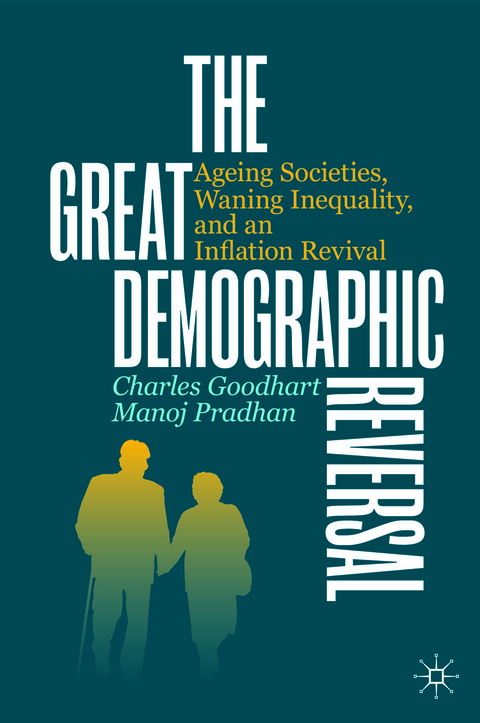
The Great Demographic Reversal
Springer International Publishing (Verlag)
978-3-030-42656-9 (ISBN)
This book will be of interest and understandable to anyone with an interest on where the world's economy may be going.
Charles Goodhart was appointed to the newly established Norman Sosnow Chair of Banking and Finance at the London School of Economics (LSE) in September 1985, which he held until his retirement in 2002 when he became Emeritus Professor of Banking and Finance. He has remained at LSE at the Financial Markets Group, initially as Deputy Director, 1987-2005, and now a member in charge of the research program in financial regulation, 2005-present. He was elected a Fellow of the British Academy in 1990, and awarded the CBE in the New Years Honours List for 1997, for services to monetary economics. During 1986, he helped to found, with Professor Mervyn King, the Financial Markets Group at LSE, which began operation at the start of 1987. For the previous 17 years he served as a monetary economist at the Bank of England, becoming a Chief Adviser in 1980. Following his advice on overcoming the financial crisis in Hong Kong in 1983, and the establishment of the link between the HK and the US $, he subsequently served on the HK Exchange Fund Advisory Committee for several years until 1997. Later in 1997 he was appointed for three years, until May 2000, one of the four independent outside members of the newly-formed Bank of England Monetary Policy Committee. Between 2002 and 2004 he returned to the Bank of England as a (part-time) adviser to the Governor on Financial Stability. He became an economic consultant to Morgan Stanley at the end of 2009, where he remained until he resigned, at the age of 80, in 2016. It was during this period that he began work on the subject matter of this book with his colleague there, Manoj Pradhan. Charles is the author of Goodhart's Law "that any observed statistical regularity will tend to collapse once pressure is placed upon it for control purposes". Manoj Pradhan is the founder of Talking Heads Macro, an independent macroeconomic research firm. Manoj was previously Managing Director at Morgan Stanley and led the Global Economics team there. He joined Morgan Stanley in 2005 after serving on the faculty of the George Washington University and the State University of New York. Manoj specializes in quantitative macroeconomics, emerging markets and global economics. He has a PhD in economics from the George Washington University and a Masters in Finance from the London Business School.
1. Introduction.- 2. China: A Historic Mobilization Ends.- 3. The Great Demographic Reversal and its Effect on Future Growth.- 4. Dependency, Dementia and the Coming Crisis of Caring.- 5. The Likely Resurgence of Inflation.- 6. The Determination of (Real) Interest Rates during the Great Reversal.- 7. Inequality and the Rise of Populism.- 8. The Phillips Curve.- 9. "Why Didn't It Happen in Japan?": A Revisionist History of Japan's Evolution.- 10. What Could Offset Global Ageing? India/Africa, Participation and Automation.- 11. The Debt Trap: Can We Avoid It?.- 12. A Switch from Debt to Equity Finance?.- 13. Future Policy Problems: Old Age and Taxes, and the Monetary-Fiscal Clash.- 14. Swimming Against the (Main)Stream.
"Charles Goodhart and Manon Pradhan have provided us an impressively articulated, well-reasoned, and thoroughly researched tour de force of the demographic forces that have impacted the evolution of the world economy and their interrelationships over the past 100 years or so ... . the research and thoughtful analysis provide the reader with an insightful window into the policy problems facing developing and emerging economies alike as we face the future." (Robert Eisenbeis, Business Economics, Vol. 56, 2021)
"I appreciate the global scope of this book and its emphasis on the complexity and interconnectedness of the global economy. This is the kind of long-term thinking that economists, policymakers, and othersmay find beneficial." (insurancenewsnet.com, June 25, 2021)
"I think this is a very good forecast. ... The book interestingly comments on an implied cycle in the standing of macroeconomics and macroeconomists. ... their argument is well worth pondering and entering into our considerations of the biggest economic risks ahead." (Alex J. Pollock, Law & Liberty, lawliberty.org, May 18, 2021)
"The Great Demographic Reversal is packed with informative charts and tables. It presents a powerful, well-argued challenge to the 'mainstream' view that low growth, inflation and nominal interest rates are here to stay. Above all, its message that everyday economics needs to take demography seriously is surely correct." (Diane Coyle, Financial Times, December 2, 2020)
"This thought-provoking book is a great read, and there is no need to be an economist to enjoy it." (Philip Turner, Central Banking, centralbanking.com, November 16, 2020)
"It is a pleasure to read a book this well argued. There is a good deal of careful analysis and there are lots of tables and graphs." (Charles Taylor, Financial World, November 2020-January 2021)
| Erscheinungsdatum | 17.08.2020 |
|---|---|
| Zusatzinfo | XX, 260 p. 84 illus., 80 illus. in color. |
| Verlagsort | Cham |
| Sprache | englisch |
| Maße | 155 x 235 mm |
| Gewicht | 542 g |
| Themenwelt | Sachbuch/Ratgeber ► Beruf / Finanzen / Recht / Wirtschaft ► Wirtschaft |
| Sachbuch/Ratgeber ► Geschichte / Politik ► Politik / Gesellschaft | |
| Sozialwissenschaften ► Pädagogik ► Sozialpädagogik | |
| Sozialwissenschaften ► Politik / Verwaltung ► Staat / Verwaltung | |
| Wirtschaft ► Volkswirtschaftslehre | |
| Schlagworte | China • decline in working population • deflation/inflation • Demography • dependency ratios • Globalisation |
| ISBN-10 | 3-030-42656-4 / 3030426564 |
| ISBN-13 | 978-3-030-42656-9 / 9783030426569 |
| Zustand | Neuware |
| Haben Sie eine Frage zum Produkt? |
aus dem Bereich



